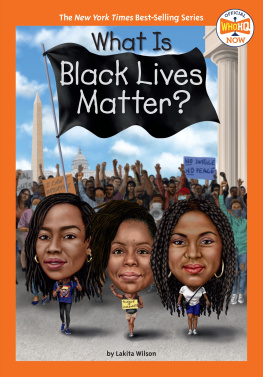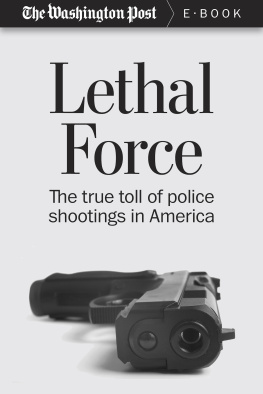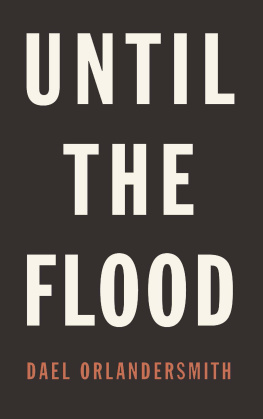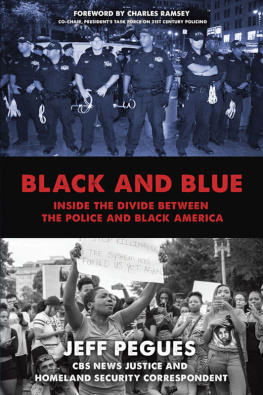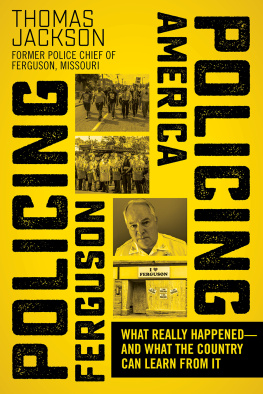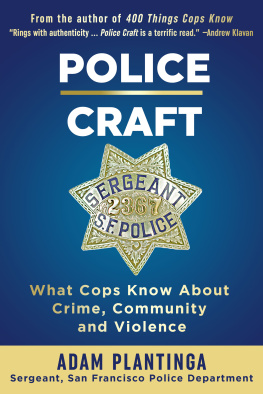
THE WAR ON POLICE
Copyright 2016 by Jeff Roorda
All rights reserved. No part of this book may be reproduced in any form or by any means whether electronic, digital, mechanical, or otherwise without permission in writing from the publisher, except by a reviewer, who may quote brief passages in a review.
Published by WND Books, Washington, D.C. WND Books is a registered trademark of WorldNetDaily.com, Inc. (WND)
Cover designed by Vi Yen Nguyen
WND Books are available at special discounts for bulk purchases. WND Books also publishes books in print formats. For more information call (541) 474-1776, e-mail .
Hardcover ISBN: 978-1-944229-52-8
eBook ISBN: 978-1-944229-53-5
Library of Congress Cataloging-in-Publication Data
Names: Roorda, Jeff, author.
Title: The war on police : how the Ferguson effect is making America unsafe / Jeff Roorda.
Description: Washington, DC : WND Books, [2016] | Includes bibliographical references and index.
Identifiers: LCCN 2016027513 (print) | LCCN 2016040691 (ebook) | ISBN 9781944229528 (hardcover) | ISBN 9781944229535 (e-book)
Subjects: LCSH: Police-community relations--Missouri--Ferguson. | Ferguson (Mo.). Police Department. | Police shootings--Missouri--Ferguson. | Police misconduct--Missouri--Ferguson. | Police--Complaints against--United States. | Police--United States. | Crime prevention--United States.
Classification: LCC HV8148.F47 R66 2016 (print) | LCC HV8148.F47 (ebook) | DDC 363.20973--dc23
LC record available at https://lccn.loc.gov/2016027513
To the men and women of law enforcement
To Darren Wilson, a true casualty of history
To my friend and teacher Mama Doris
To my little brother Timmy, I miss you
TABLE OF CONTENTS
A lie cannot live.
DR. MARTIN LUTHER KING JR.
The pursuit of truth does not permit violence on ones opponent.
MAHATMA GANDHI
No one is born hating another person because of the color of his skin People must learn to hate, and if they can learn to hate, they can be taught to love, for love comes more naturally to the human heart than its opposite.
NELSON MANDELA
If you want to end the war then instead of sending guns, send books. Instead of sending tanks, send pens. Instead of sending soldiers, send teachers.
MALALA YOUSAFZAI, 2014 NOBLE PEACE PRIZE WINNER (AGE 17)
I dont know how you would characterize the gang leaders who got 13-year-old kids hopped-up on crack and sent them out on the street to murder other African-American children. Maybe you thought they were good citizens You are defending the people who killed the lives you say matter. Tell the truth!
FORMER PRESIDENT BILL CLINTON TO BLACK LIVES MATTER PROTESTORS
PREFACE
This is not my story. This is not Darren Wilsons story. This is law enforcements story.
It is a story that ought to be told.
It is a story that has to be told.
I figure Im just the guy to tell it.
While this is unmistakably law enforcements story, I dont claim to speak for all cops or for any particular group of cops. This book, as I see it, is the police viewpoint of Ferguson and its aftermath.
Indeed, I have a unique perspective to lend to this story. Through an unlikely, almost implausible series of seemingly unrelated events, I landed in the front-row-center seat for one of the strangest, most divisive chapters in American history. Whatever you may call it chance, kismet, bad luck I was somehow flung smack-dab into the middle of a fray that, more than any event Ive witnessed in my lifetime, polarized public opinion and galvanized social behavior in my community and across America.
Through what can be described as little more than happenstance, I somehow ended up as the de facto national spokesman for law enforcement in the face of perhaps the harshest, most protracted attack police work has ever come under. In hindsight, maybe it was inevitable that the planets would align the way they did. Destiny, as they say, is written in the stars.
I started in law enforcement as a 911 dispatcher in 1986. From there, one police job led to the next beat cop, detective, undercover narcotics agent, police sergeant until I ended my police career eighteen years later as a police chief and city administrator.
Thats when I successfully ran for public office and was elected to the Missouri House of Representatives. I served four terms in the House, but they were not uninterrupted terms. In 2010, I was benched for two years when the Tea Party wave swept me and other moderate Democrats out of office. I returned to office in 2012 when I cruised to victory in a newly drawn House seat. In the interceding two years out of office, I was hired by Missouri governor Jay Nixon to work in his administration as the special assistant to the director of public safety. I stayed in that job only briefly because a couple of months after my appointment by the governor, the St. Louis Police Officers Association (SLPOA), an affiliate of the Fraternal Order of Police (FOP), the nations largest police union, offered me a job.
The SLPOA, which represented well over one thousand police officers in St. Louis City, was negotiating a union contract with the police department. They wanted me to come on board as their business manager to help get the deal across the finish line, and then administer the contract once it was inked. I leapt at the opportunity. It seemed like a perfect fit. Even when I won my election to return to the legislature in 2012, the SLPOA asked me to stay on and agreed to let me work a part-time schedule when the House was in session.
The idea of working for the FOP was an enticing one. I was an active, loyal member of the order and had achieved the rare status of life member, although I belonged to the lodge in St. Louis County that represented the suburbs surrounding the city. Around the same time the SLPOA hired me, my FOP lodge asked me to join the board of directors of the Shield of Hope charity they had just created. The Shield was formed to help pay for scholarships and to help officers and their families when they were hurt on the job or, God forbid, killed in the line of duty. So, it was an easy decision; of course Id help. After all, the charitys annual budget was only supposed to be three to four thousand dollars, and we didnt anticipate having to meet much more than once a year.
Then Ferguson happened, and everything changed in an instant.
The SLPOA and the Shield of Hope both needed a spokesman. I was tapped for the job by both organizations. St. Louis police officers had responded to assist with the riots in Ferguson, and were involved in some high-profile police shootings themselves. The Shield of Hope stepped up to raise money to assist Darren Wilson and other officers in Ferguson with legal, medical, and relocation expenses, and eventually raised around three hundred thousand dollars in a very short time as money came pouring in.
At first, there were a number of us who were associated with the FOP in St. Louis City and St. Louis County, each of whom rotated the duties of making the rounds with local and national media. Ultimately though, the spotlight came to rest on me, which propelled me onto the national stage, not only to speak out about issues connected to Ferguson, but eventually to weigh in on police-related incidents in Baltimore, Staten Island, and elsewhere.
Along the way, I did more than seventy-five nationally broadcast television interviews and also became CNNs go-to guy when it came to questions about Ferguson and its aftermath as well as police tactics in other places around the country. In addition to national television, I did hundreds more interviews with print media, radio, and local TV news stations to debunk the false narrative that had emerged from Ferguson, and chronicle the realities on the ground. Reality in Ferguson, it seemed, was slipping through the fingers of history like fine sand.


